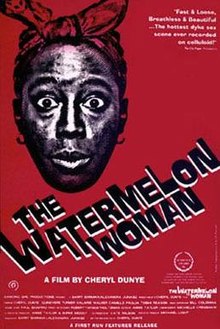The Watermelon Woman
| The Watermelon Woman | |
|---|---|

Original movie poster
|
|
| Directed by | Cheryl Dunye |
| Produced by |
Alexandra Juhasz Barry Swimar |
| Written by | Cheryl Dunye |
| Starring | Cheryl Dunye Guinevere Turner |
| Music by | Paul Shapiro |
| Cinematography | Michelle Crenshaw |
| Edited by | Cheryl Dunye |
| Distributed by | First Run Features |
|
Release date
|
|
|
Running time
|
90 minutes |
| Country | United States |
| Language | English |
| Budget | $300,000 |
The Watermelon Woman is a 1996 feature film by filmmaker Cheryl Dunye about Cheryl, a young black lesbian working a day job in a video store while trying to make a film about a black actress from the 1930s known for playing the stereotypical "mammy" roles relegated to black actresses during the period. It was the first feature film directed by a black lesbian.
Cheryl is a young, African American lesbian who works in a video rental store in Philadelphia with her friend Tamara. They earn extra money by making professional home videos for people. Cheryl becomes interested in films from the 1930s and 40s which feature black actresses. She notices that these actresses are often not credited. She watches a film called Plantation Memories with a black actress who is credited simply as "The Watermelon Woman". Cheryl decides to make a documentary about the Watermelon Woman and find out more about her life.
Tamara tries to set Cheryl up with her friend Yvette, but Cheryl is not interested. Cheryl meets a white woman in the store called Diana who, to Tamara's annoyance, flirts with Cheryl.
Cheryl starts interviewing members of the public, asking them if they have heard of the Watermelon Woman. She interviews her mother who does not remember the name, but recognises a photograph of her. She tells Cheryl that she used to hear the Watermelon Woman singing in clubs in Philadelphia. Tamara's mother tells Cheryl to get in contact with Lee Edwards — a man who has done a lot of research into black films. Cheryl and Tamara go to see Lee, and he tells them about 1920s and 30s black culture in Philadelphia. He explains to them that in those days, black women usually played domestic servants.
Cheryl meets her mother's friend Shirley, who turns out to be a lesbian. Shirley tells her that the Watermelon Woman's name was Fae Richards, that she was a lesbian too, and that she used to sing in clubs "for all us stone butches". She says that Fae was always with Martha Page, the white director of Plantation Memories.
When Cheryl and Tamara get caught ordering video tapes under Diana's name, Diana takes the tapes and tells Cheryl that she will have to come to her home to collect them. Cheryl goes to Diana's house, stays for dinner, and watches some of the tapes with her, telling her about her project. They have sex, and Cheryl decides that although Diana is not her usual type of woman, she likes being with her.
...
Wikipedia
